The Boundless Optimism of BTS
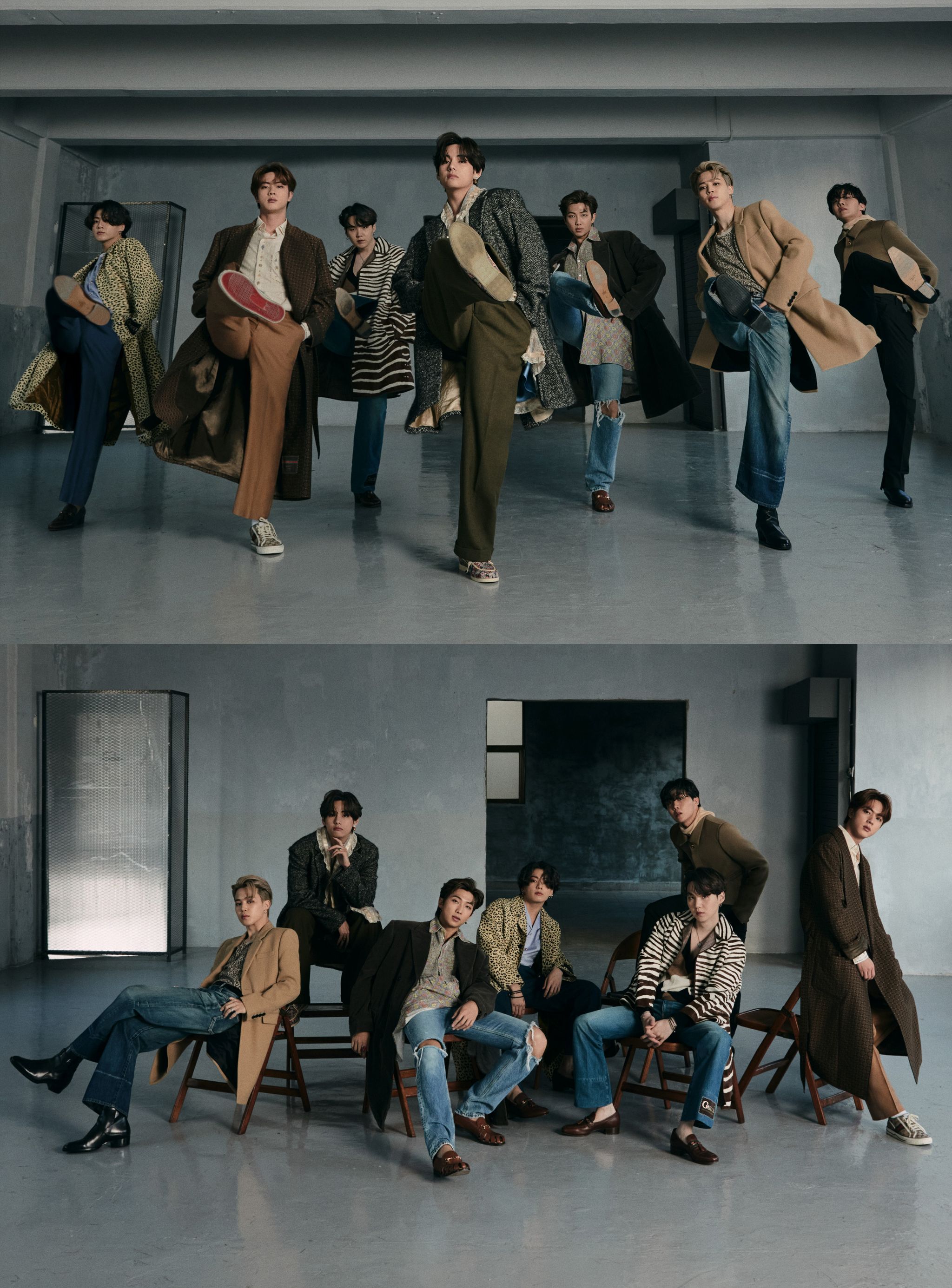
From left (first photo): On Jung Kook:Coat, shirt, jeans, loafers, and belt by Gucci. On Jin: Coat, shirt, trousers, and sneakers by Gucci. On Suga: Coat, sweater, jeans, loafers, and necklace by Gucci. On V: Coat, shirt, trousers, shoes, and earring by Gucci. On RM: Coat, shirt, jeans, loafers, earring, and ring by Gucci. On Jimin: Coat, T-shirt, jeans, boots, belt, and necklace, Saint Laurent by Anthony Vaccarello. On J-Hope: Jacket, turtleneck, trousers, boots, and ring by Bottega Veneta.
HONG JANG HYUN
IT IS THE MORNING OF CHUSEOK, A KOREAN HARVEST FESTIVAL akin to Thanksgiving, and the members of BTS would normally be spending it with their families, eating tteokguk, a traditional rice-cake soup. Instead, Jin, 28; Suga, 27; J-Hope, 26; RM, 26; Jimin, 25; V, 24; and Jung Kook, 23, are working. Practicing. Honing their choreography. In a few days, the biggest musical act in the world will perform in the live-stream concert that, for now, will have to stand in for the massive tour they spent the first part of this year rehearsing. At this moment, they’re seated inside Big Hit Entertainment headquarters in Seoul, South Korea, the house they built, dressed mostly in black and white, ready to answer my questions. They’re gracious about it. And groggy.
Before I’m done speaking with them for this story, BTS will have the number-one and number-two songs on the BillboardHot 100, a feat that’s been achieved only a handful of times in the sixty-odd years the chart has existed. Their next album, Be, is weeks away from being released, and speculation about the record, the tracklist, the statement, is rampant across the Internet. BTS are, to put it mildly, huge.

On V: Jacket and turtleneck by Berluti. On Suga: Jacket, shirt, and turtleneck by Berluti. On J-Hope: Jacket and shirt by Givenchy. On Jung Kook: Coat, sweater, and turtleneck by Berluti. On Jimin: Coat, shirt, and earring by Bottega Veneta. On Jin: Coat and turtleneck by Berluti. On RM: Jacket and turtleneck by Berluti.
There is something about complete world domination that can really cement a friendship. What jumps out at me as I connect with the members of BTS is their level of comfort with one another. Tension has a way of making itself evident—even over Zoom, even through a translator. There’s none to be found here. They are relaxed in the manner of family. Lounging with their arms around each other’s shoulders, tugging on each other’s sleeves, fixing each other’s collars. When they speak about one another, it is with kindness.
“Jimin has a particular passion for the stage and really thinks about performance, and in that sense, there are many things to learn from him,” J-Hope says. “Despite all the things he has accomplished, he still tries his best and brings something new to the table, and I really want to applaud him for that.”
“Thank you for saying all these things about me,” Jimin responds.
Jimin turns his attention to V, explaining that he is “loved by so many” and describing him as one of his best friends. Suga jumps in, sharing that Jimin and V fight the most among the group. V replies, “We haven’t fought in three years!” They tell me this distinction now belongs to Jin and Jung Kook, the oldest and youngest members. “It all starts as a joke, but then it gets serious,” Jimin says.
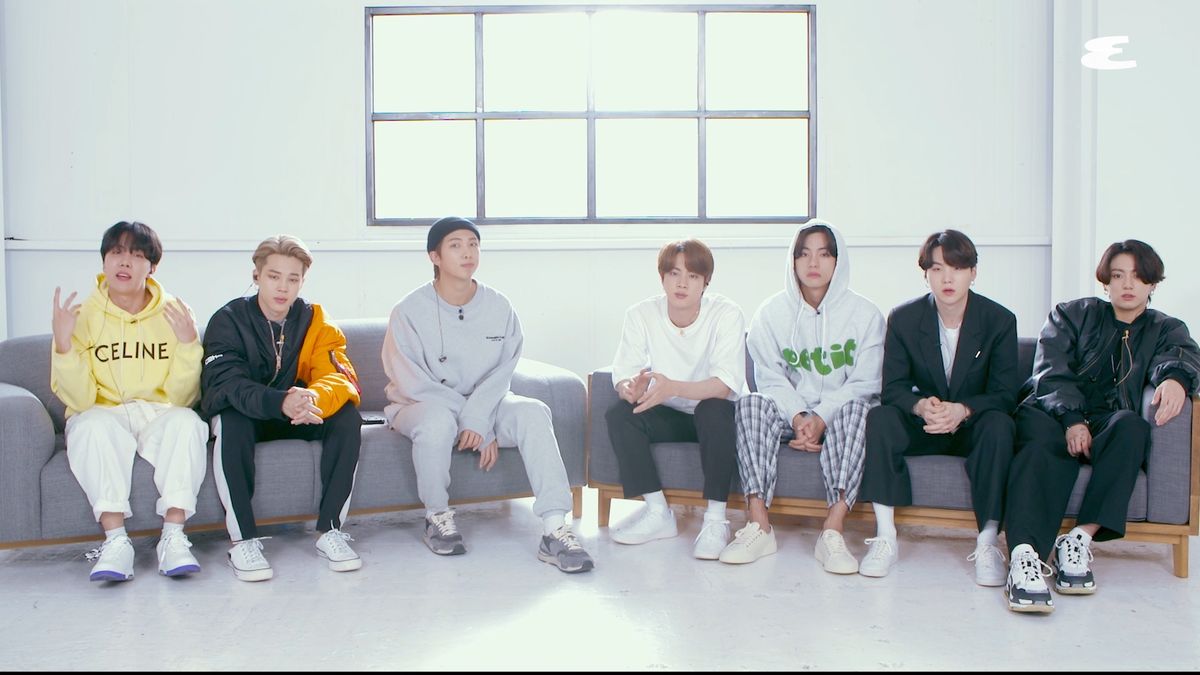
Jin agrees and recounts what their arguments sound like. “Why did you hit me so hard?” he says, before mimicking Jung Kook’s response: “I didn’t hit you that hard.” And then they start hitting each other. But not that hard.
Since the start of their careers, BTS have shown a certain confidence in their aesthetic, their performances, and their music videos. It’s right there in the name: BTS stands for “Bangtan Sonyeondan,” which translates to “Bulletproof Boy Scouts,” but as their popularity grew in English-speaking markets, the acronym was retrofitted to mean “Beyond the Scene,” which Big Hit has described as “symbolizing youth who don’t settle for their current reality and instead open the door and go forward to achieve growth.” And their affection with one another, their vulnerability and emotional openness in their lives and in their lyrics, strikes me as more grown-up and masculine than all the frantic and perpetual box-checking and tone-policing that American boys force themselves and their peers to do. It looks like the future.
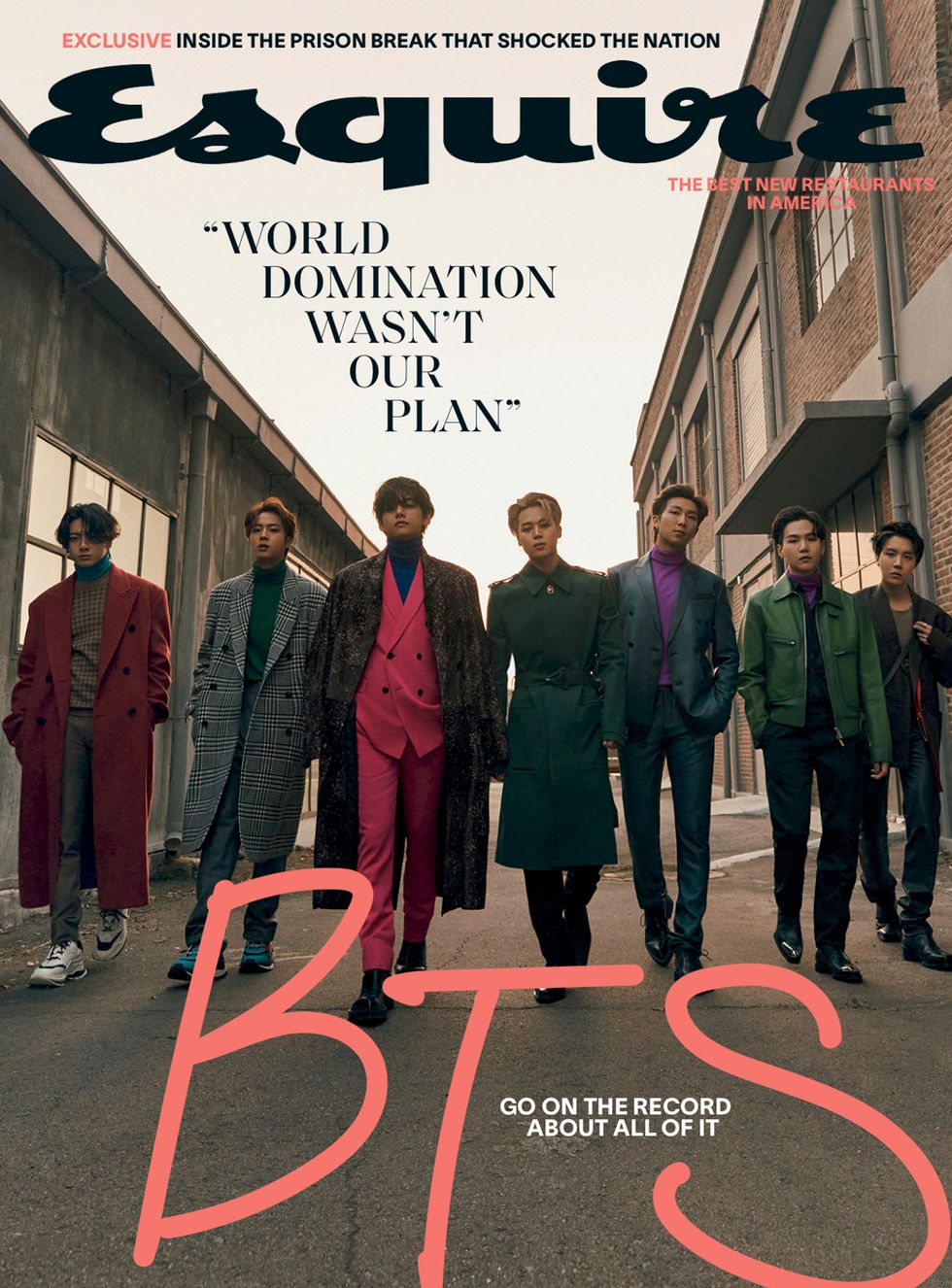
Esquire
This article appears in the Winter 2020/21 issue of Esquire.
subscribe
“There is this culture where masculinity is defined by certain emotions, characteristics. I’m not fond of these expressions,” Suga tells me. “What does being masculine mean? People’s conditions vary day by day. Sometimes you’re in a good condition; sometimes you aren’t. Based on that, you get an idea of your physical health. And that same thing applies mentally. Some days you’re in a good state; sometimes you’re not. Many pretend to be okay, saying that they’re not ‘weak,’ as if that would make you a weak person. I don’t think that’s right. People won’t say you’re a weak person if your physical condition is not that good. It should be the same for the mental condition as well. Society should be more understanding.”
When I hear these words in October 2020, from my house in a country whose leader is actively trying to make the case that only the weak die of COVID-19, well, it sounds like the future, too.
IF YOU ARE JUST NOW CONSIDERING GETTING INTO BTS, IT IS natural to feel overwhelmed by the sheer amount of stuff. It’s a bit like saying, right this second, “Let’s see what Marvel Comics is all about.” In the streaming age, BTS have sold more than twenty million physical units across fourteen albums. Their multi-album concept cycles, The Most Beautiful Moment in Life, Love Yourself, and Map of the Soul, have unfolded over multiple records and EPs. There are collaborations with brands, including a BTS smartphone with Samsung. There is a series of short films and music videos, called BU, or BTS Universe, and an animated universe called BT21, in which they’re all represented by gender-neutral avatars. Their fan base, known as ARMY, is a global cultural movement unto itself.
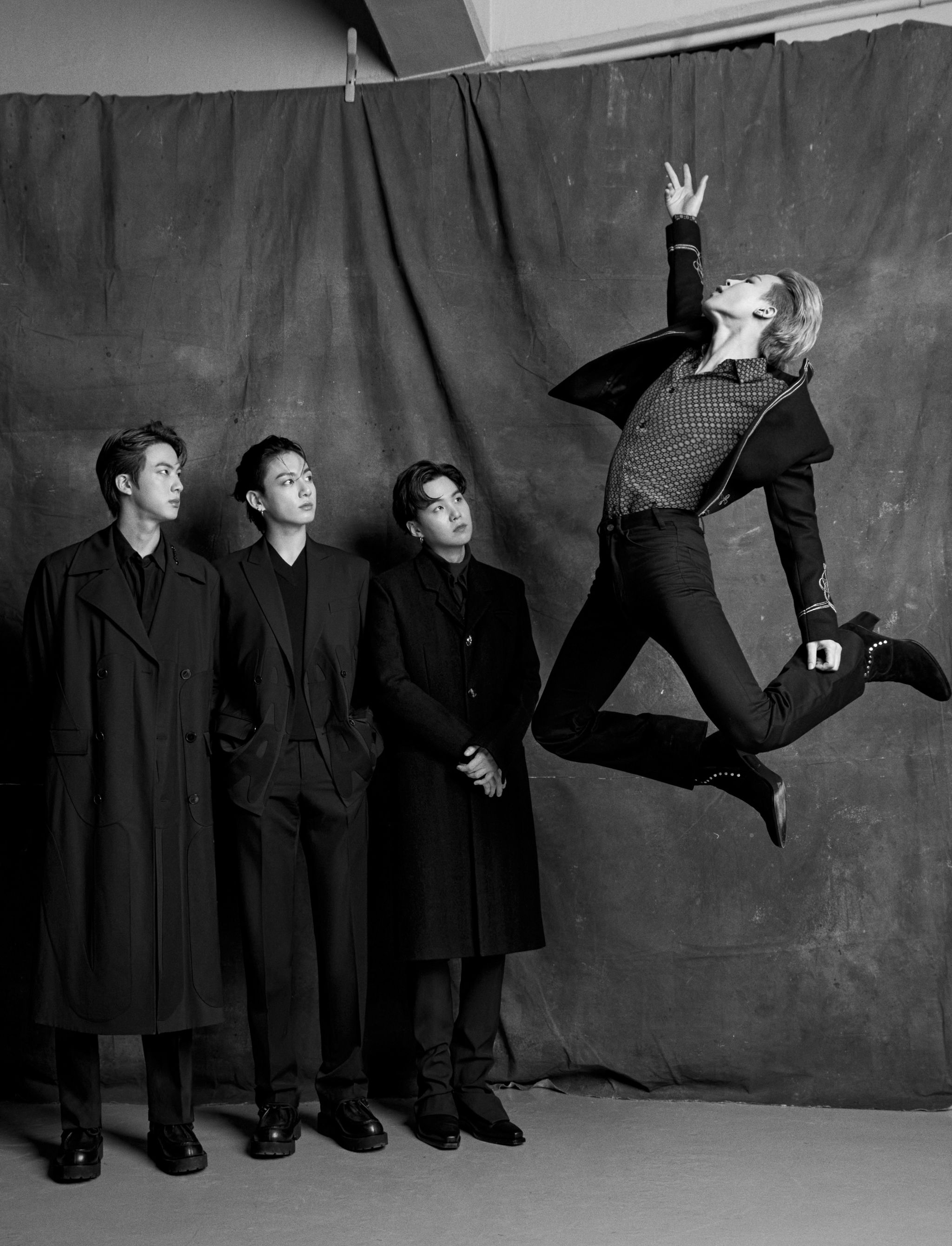
On Jin: Coat, shirt, and trousers by Valentino; shoes by Valentino Garavani. On Jung Kook: Jacket, sweater, and trousers by Valentino; shoes by Valentino Garavani. On Suga: Coat, shirt, turtleneck, trousers, and boots by Bottega Veneta. On Jimin: Jacket, shirt, trousers, and boots, Celine by Hedi Slimane.
HONG JANG HYUN
“Dynamite,” their first English-language single and their first American number one, is pure, ecstatic pop. Shiny and joyful. What sets them apart from many of their peers, and many of the pop acts who achieved worldwide fame before them, is what came earlier. Beneath the sheen and the beats has always been an unflinching examination of human emotion. Their lyrics seek to challenge the conventions of society—to question and even denounce them. BTS’s first single, “No More Dream,” unveiled at their debut showcase in June 2013, concerns the intense pressure South Korean schoolchildren face to conform and to succeed. According to Suga, lyrics about the mental health of young people were mostly absent in Korean pop music. “The reason I started making music is because I grew up listening for lyrics that speak about dreams, hopes, and social issues,” he tells me. “It just came naturally to me when making music.”
Suga’s early ambition of making music didn’t involve him being in a group at all. About a decade ago, in his hometown of Daegu, the fourth-largest city in South Korea, he started recording underground rap tracks under the name Gloss, listening to and learning from the early works of songwriter and producer Bang Si-hyuk, known as Hitman Bang. Bang is the founder and CEO of Big Hit Entertainment. In 2010, Suga, a junior in high school, moved to Seoul to join Big Hit as a producer and rapper. Then Bang asked him to become part of a group, envisioning a hip-hop act with fellow new Big Hit recruits RM and J-Hope. The guys call this “season one” of their development.
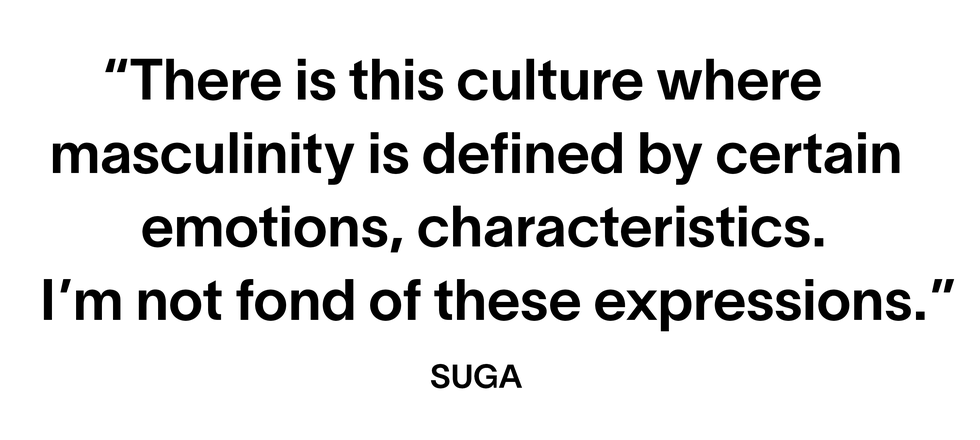
“At that time, I don’t think our label exactly knew what to do with us,” RM says. “They just basically let us be and we had some lessons, but we also just chilled and made music sometimes.”
It got more intense. The family grew, occasionally by accident.
V accompanied a friend to a Big Hit casting call in Daegu for moral support and ended up being the person chosen from those sessions.
Jung Kook was signed in a feeding frenzy after being dropped from the talent show Superstar K, fielding offers from numerous entertainment companies before settling on Big Hit because he was impressed by RM’s rapping.
Jimin was a dance student and class president for nine years running at his school in Busan; he auditioned at the behest of his teacher.
And then, to hear him tell it, Jin got picked up off the street. “I was just going to school,” he says. “Someone from the company approached me, like, ‘Oh, this is my first time seeing anyone that looked like this.’ He suggested having a meeting with me.”
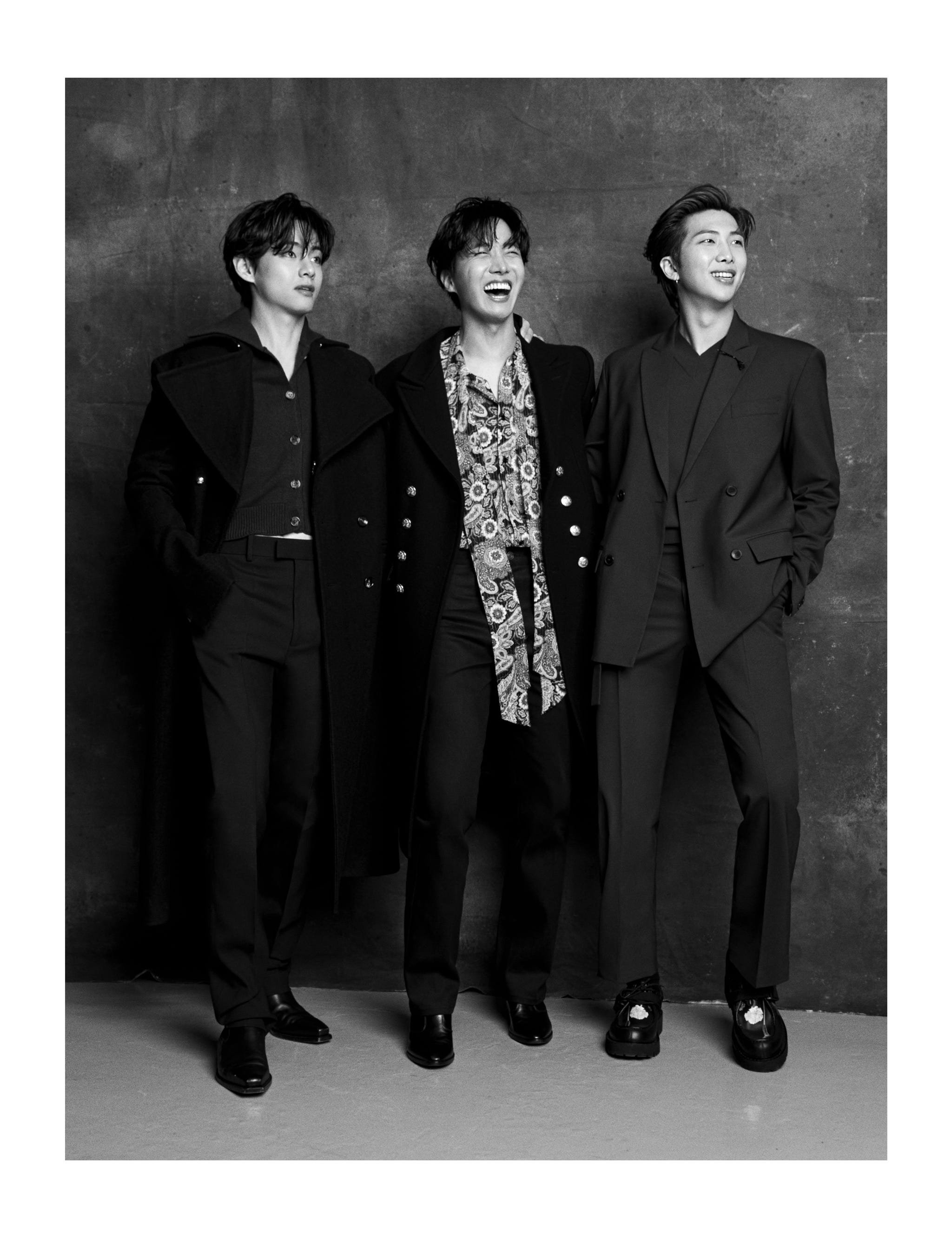
On V: Coat, cardigan sweater, trousers, boots, and earring by Bottega Veneta. On j-hope: Coat, shirt, trousers, and boots, Celine by Hedi Slimane. On RM: Jacket, sweater, and trousers by Valentino; shoes and brooch by Valentino Garavani.
HONG JANG HYUN
“Season two is when we officially underwent hard training,” J-Hope says. “We started dancing, and that’s how I would say our team building started.”
School in the daytime, training at night. “We slept during classes,” V says.
“I slept in the practice studio,” J-Hope counters.
Hitman Bang kept the pressure comparatively low. And he encouraged the guys to write and produce their own music, to be honest about their emotions in their lyrics. Suga is on record saying that no BTS album would be complete without a track that scrutinizes society.
And yet for their new album, Be, they’re putting that aside. Even this has a greater purpose that relates to mental wellness: RM, the group’s main rapper, says, “I don’t think this album will have any songs that criticize social issues. Everybody is going through very trying times right now. So I don’t think there will be any songs that will be that aggressive.”
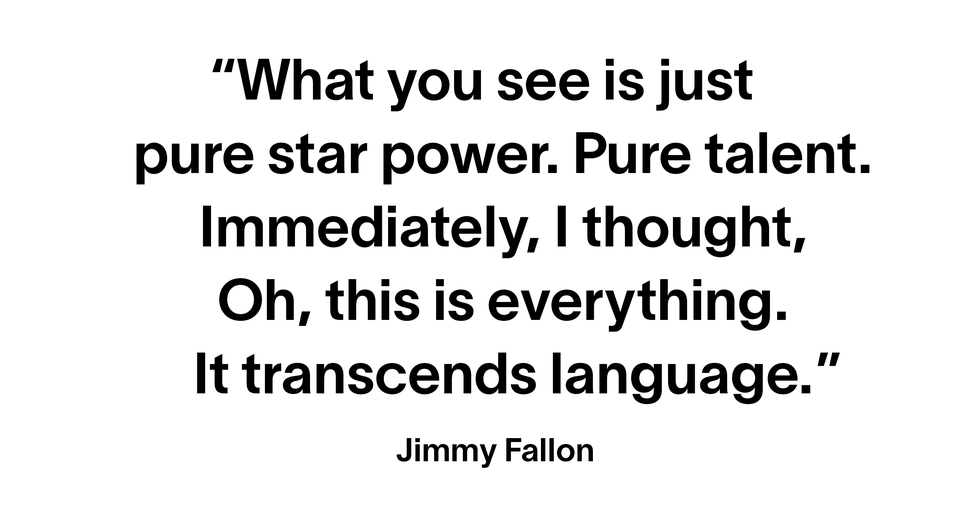
Though the new rules of COVID-19 mean they can’t come here and promote Be, its first single might not have happened in the first place but for the pandemic. “ ‘Dynamite’ wouldn’t be here if there was no COVID-19,” says RM. “For this song, we wanted to go easy and simple and positive. Not some, like, deep vibes or shadows. We just wanted to go easy.”
Jin agrees. “We were trying to convey the message of healing and comfort to our fans.” He pauses. “World domination wasn’t actually our plan when we were releasing ‘Dynamite.’ ” World domination just happens sometimes. You get it.
MAP OF THE SOUL ONE AIRED VIA THEIR ONLINE FAN PLATFORM and attracted almost a million viewers across 191 countries. The guys say they tried not to think about the enormousness. J-Hope adds, “I felt a little bit more nervous knowing that this was being broadcast live. I actually feel less nervous performing live at a stadium.” Jin replies with a smile, “J-Hope, born to perform at a stadium.”
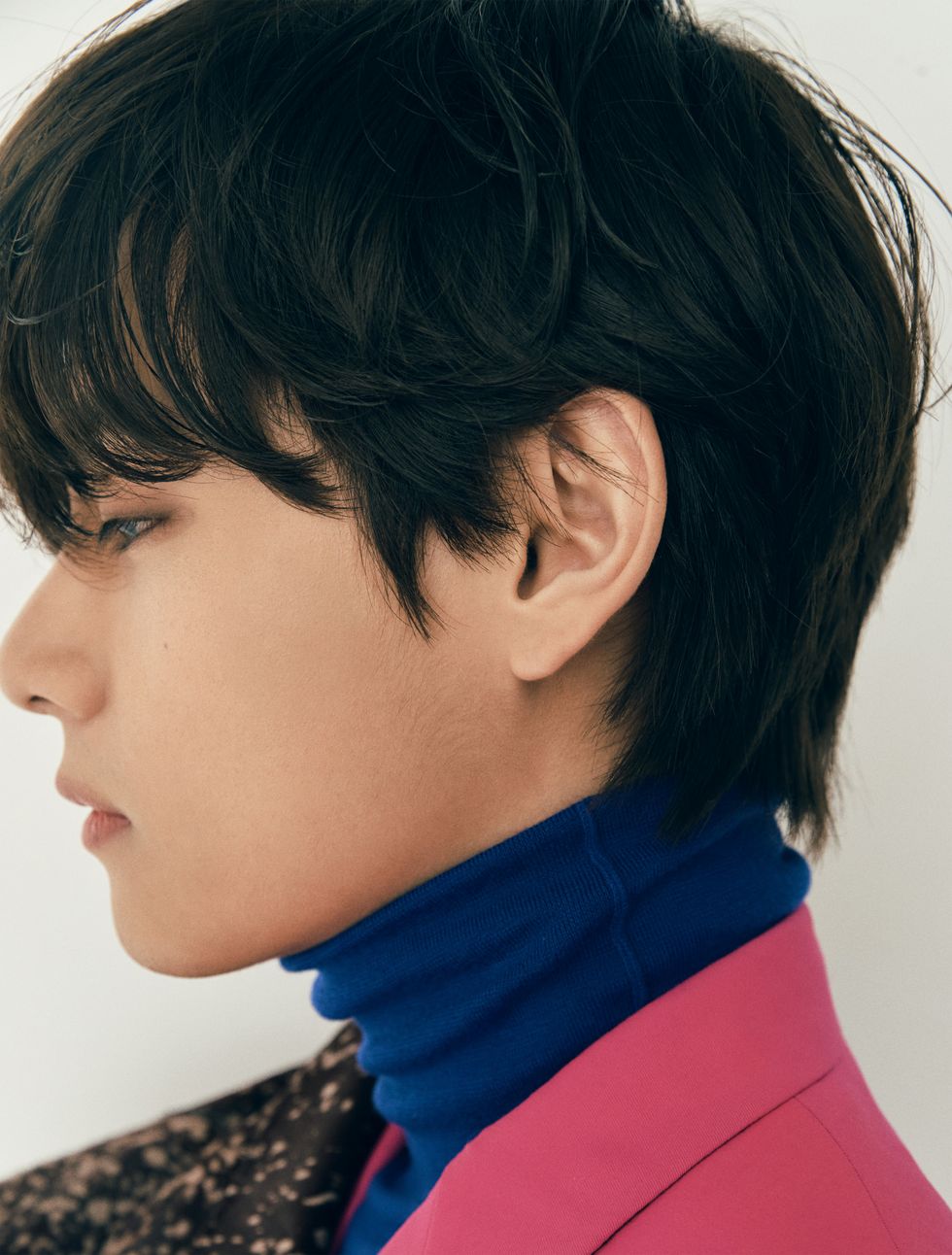
On V: Coat, jacket, and turtleneck by Berluti.
HONG JANG HYUN
The graphic layout of the title throws a colon between the final N and E, which makes it look like Map of the Soul On: E, and as I watch it live, as I do in my office at 3:00 a.m. with noise-canceling headphones and a steaming pot of coffee, it feels a lot like I’m watching Map of the Soul on E. It is an explosion of color and fashion and passion, over four gigantic stages, from the boozy swagger of “Dionysus” to the emo-trap introspection of “Black Swan.” Not a step, not a gesture, not a hair is out of place. If there were nerves, they didn’t come through.
There is also, at the end of Map of the Soul One, an intimate version of their 2017 track “Spring Day,” which encapsulates what’s really made BTS stand out. On the surface, it’s about nonspecific love and loss, about yearning for the past. “I think that song really represents me,” says Jin. “I like to look to the past and be lost in it.”
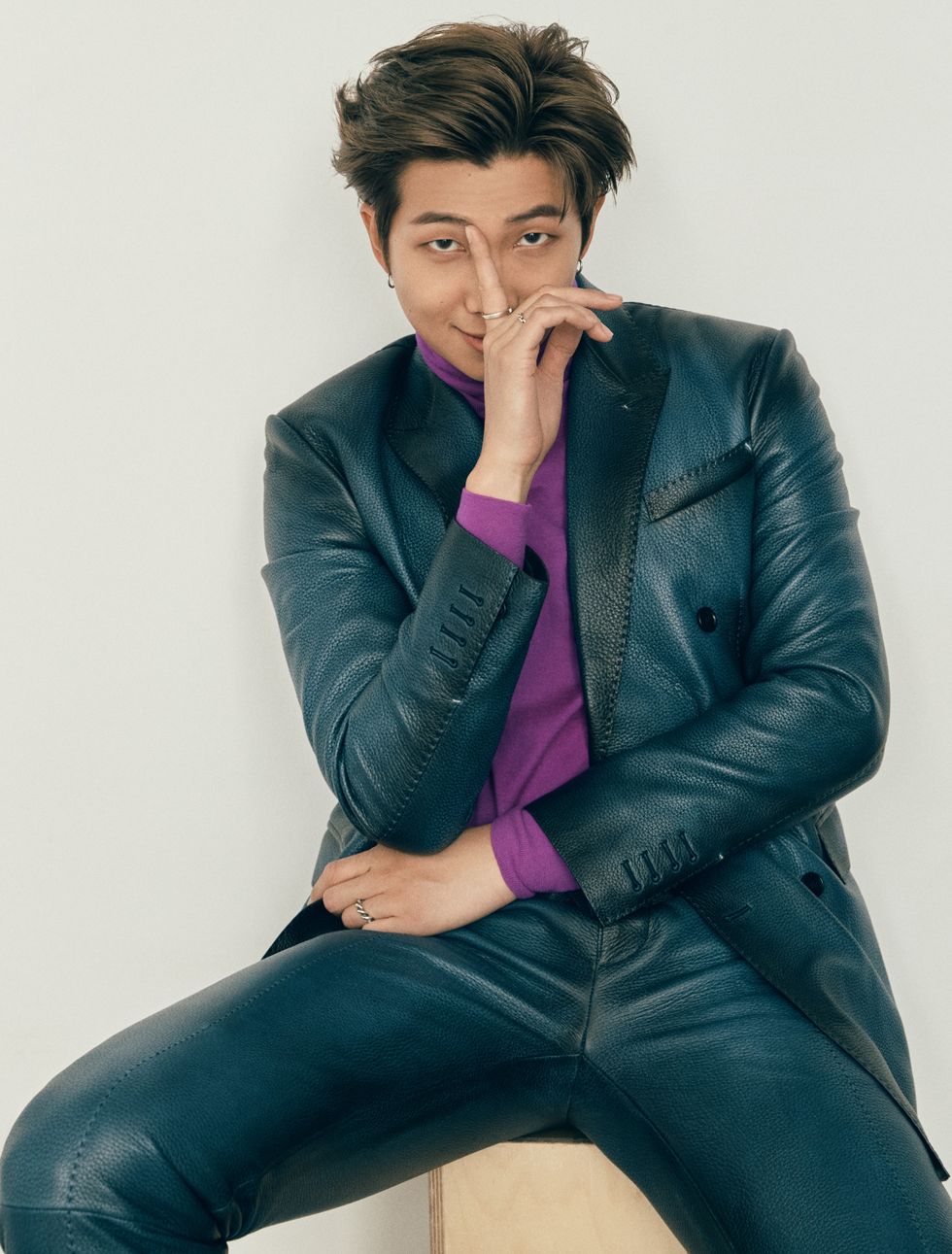
On RM: Jacket, turtleneck, and trousers by Berluti
HONG JANG HYUN
Fair enough, but there is an undeniable allusion, in both the song’s video and its cover concept, to a specific incident in recent South Korean history. “Spring Day” was released just a few years after the sinking of the Sewol ferry, one of the country’s biggest maritime disasters, in which a poorly inspected, overloaded ferry toppled in a sharp right turn. Hundreds of high school students drowned, having obeyed orders to stay in their cabins as the boat was going down. According to some reports, the South Korean government actively tried to silence entertainers who spoke out against it, with the Korean Ministry of Education fully banning the tragedy’s commemorative yellow ribbons in schools. I ask whether it was about a specific sad event, and Jin tells me, “It is about a sad event, as you said, but it is also about longing.” The song kept the disaster front of mind for young Koreans and for the media, indirectly leading to the impeachment and removal of then president Park Geun-hye.
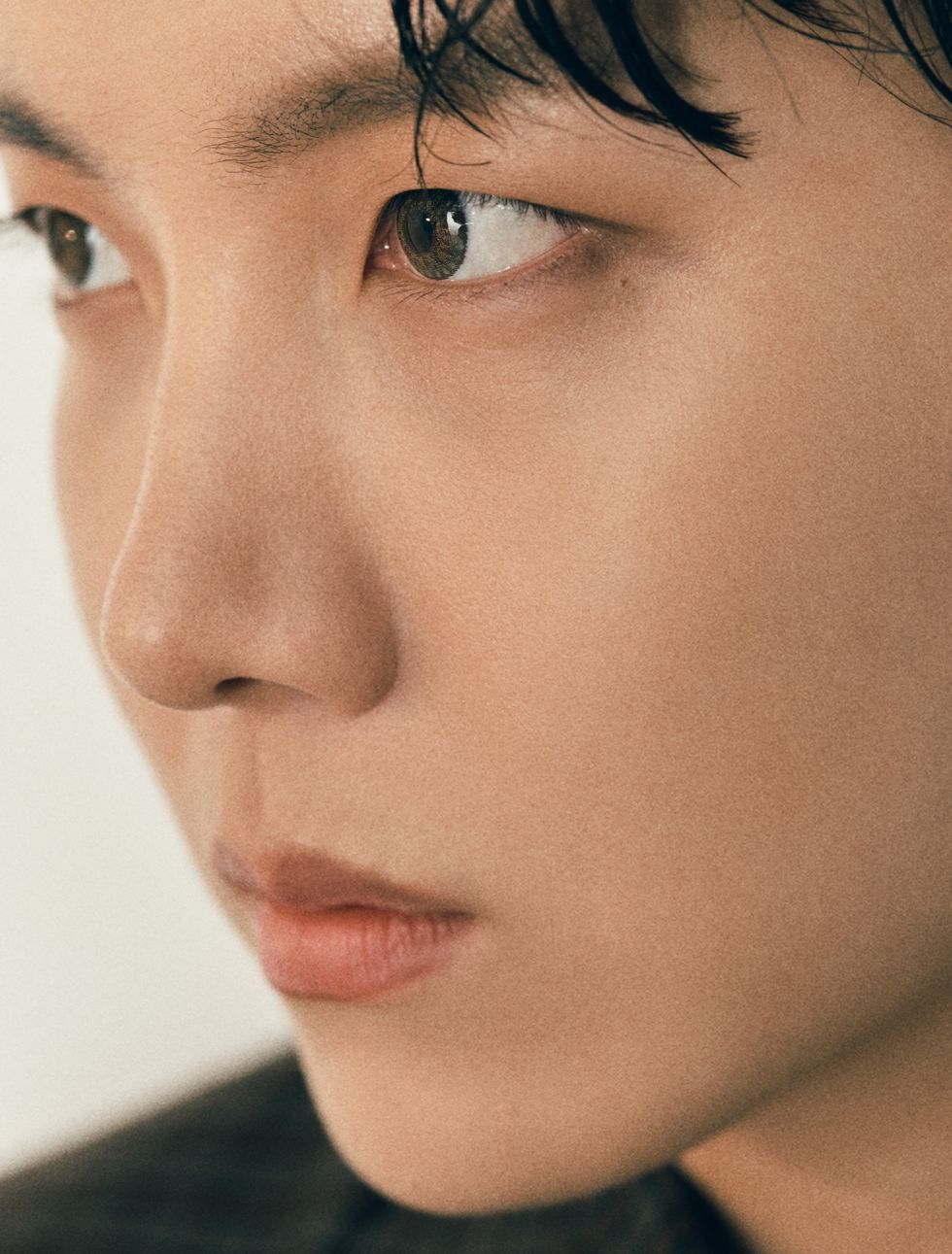
On j-hope: Jacket, shirt, trousers, and bag by Givenchy.
HONG JANG HYUN
If an overburdened, undermaintained, slow-moving vessel capsizing because of a reckless rightward turn strikes you as somehow symbolic of the country in which BTS are about to explode even further, you won’t hear it from them. “We’re outsiders—we can’t really express what we feel about the United States,” says V. But their actions speak volumes; in the wake of the George Floyd murder and subsequent protests in America, the group made a $1 million donation with Big Hit Entertainment to Black Lives Matter, one that was matched by BTS ARMY.
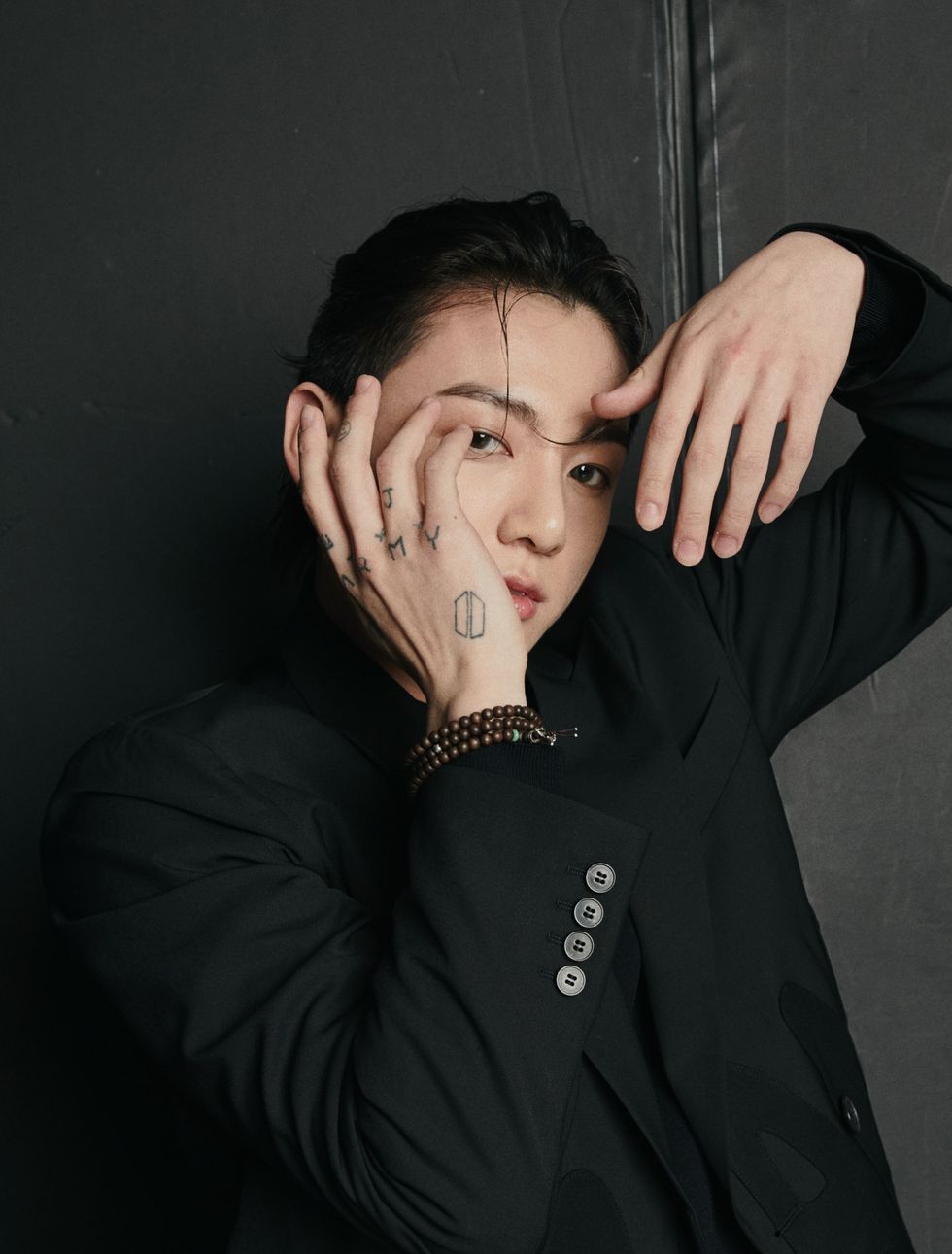
On Jung Kook: Jacket and sweater by Valentino.
HONG JANG HYUN
The fans offer a fascinating inversion of stan culture: Rather than bullying rivals like many other ardent online fan bases do, ARMY have put the positive message of the music into action. Their activism goes deep. Through micro-donations, they’ve regrown rain forests, adopted whales, funded hundreds of hours of dance classes for Rwandan youth, and raised money to feed LGBTQ refugees around the world. Where pop fans a generation ago might have sent teddy bears or cards to their idols for their birthdays, where five years ago they might have promoted a hashtag to get a video’s YouTube viewer count up, for RM’s twenty-sixth birthday in September, international fan collective One in an Army raised more than $20,000 for digital night schools to improve rural children’s access to education during the COVID-19 crisis. ARMY may have even entered the conversation around the 2020 presidential election when hundreds of thousands of Tulsa Trump rally tickets got snapped up online in June. The event’s actual attendance was pathetically low. No particular person or entity claimed credit for this top-notch trolling, but a video urging BTS fans to RSVP to that rally did get hundreds of thousands of views. We have no choice but to stan this fan base.
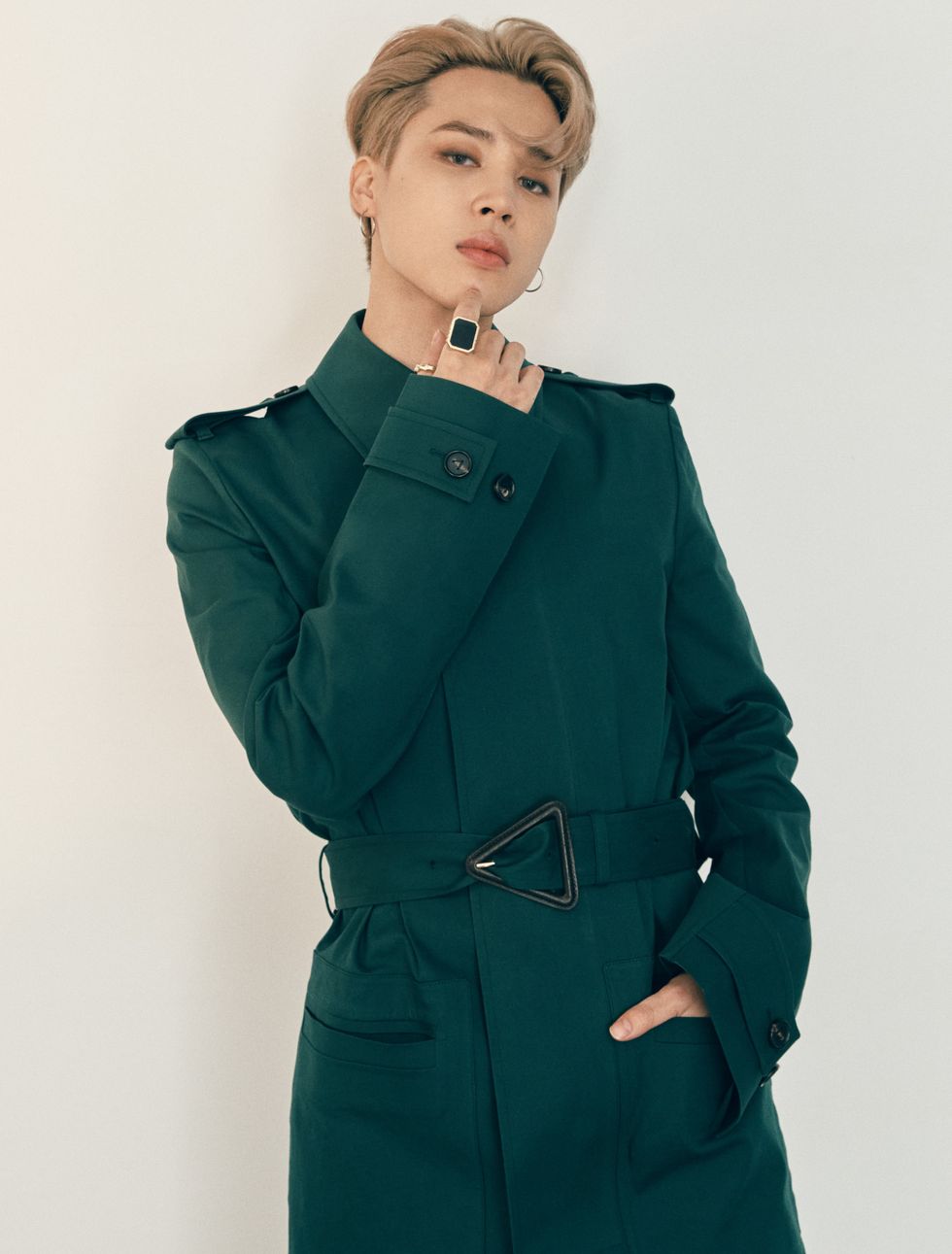
On Jimin: Coat, trousers, boots, and earring by Bottega Veneta
HONG JANG HYUN
The relationship is intense. “We and our ARMY are always charging each other’s batteries,” RM says. “When we feel exhausted, when we hear the news all over the world, the tutoring programs, and donations, and every good thing, we feel responsible for all of this.” The music may have inspired the good works, but the good works inspire the music. “We’ve got to be greater; we’ve got to be better,” RM continues. “All those behaviors always influence us to be better people, before all this music and artist stuff.”
Yet for every devoted member of BTS ARMY, there is someone who’s looked right past BTS. Jimmy Fallon, whose Tonight Show hosted the group for a full week this past fall, was one of those people. “Usually if an artist is on the rise, I hear about them ahead of time. With BTS, I knew they had crazy momentum, and I’d never heard of them.”
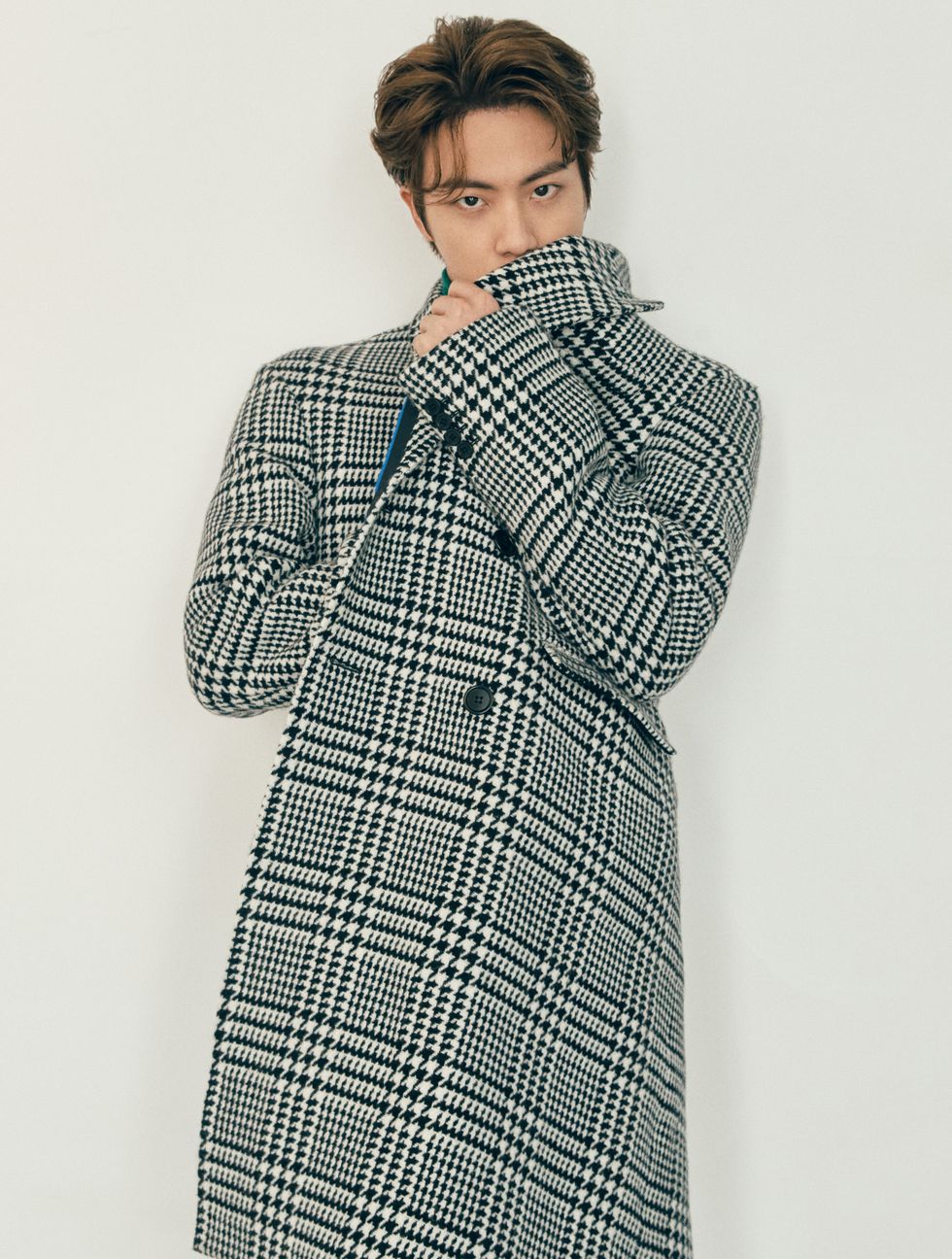
On Jin: Coat by Berluti.
HONG JANG HYUN
Here’s a thought that used to be funny to me: There were members of the live audience of The Ed Sullivan Showon February 9, 1964, who weren’t there to see the Beatles. Elvis was in the Army, Buddy Holly was gone, and the three number-one albums in the months before Meet the Beatles! were an Allan Sherman comedy record, the West Side Story original cast recording, and Soeur Sourire: The Singing Nun. America had left rock ’n’ roll behind for the moment, and with the culture aimless and fragmented, it wasn’t quite sure what to pick up in its place. It is possible to imagine that a youngish, reasonably hip, and culturally aware human being might cop a ticket to that week’s show, settle into his seat, and say, “Bring on a medley of numbers from the Broadway musical Oliver! and banjo sensation Tessie O’Shea.”
The instinct is to laugh at that guy, and it’s a good instinct, because what a dope.
And then you become that guy.
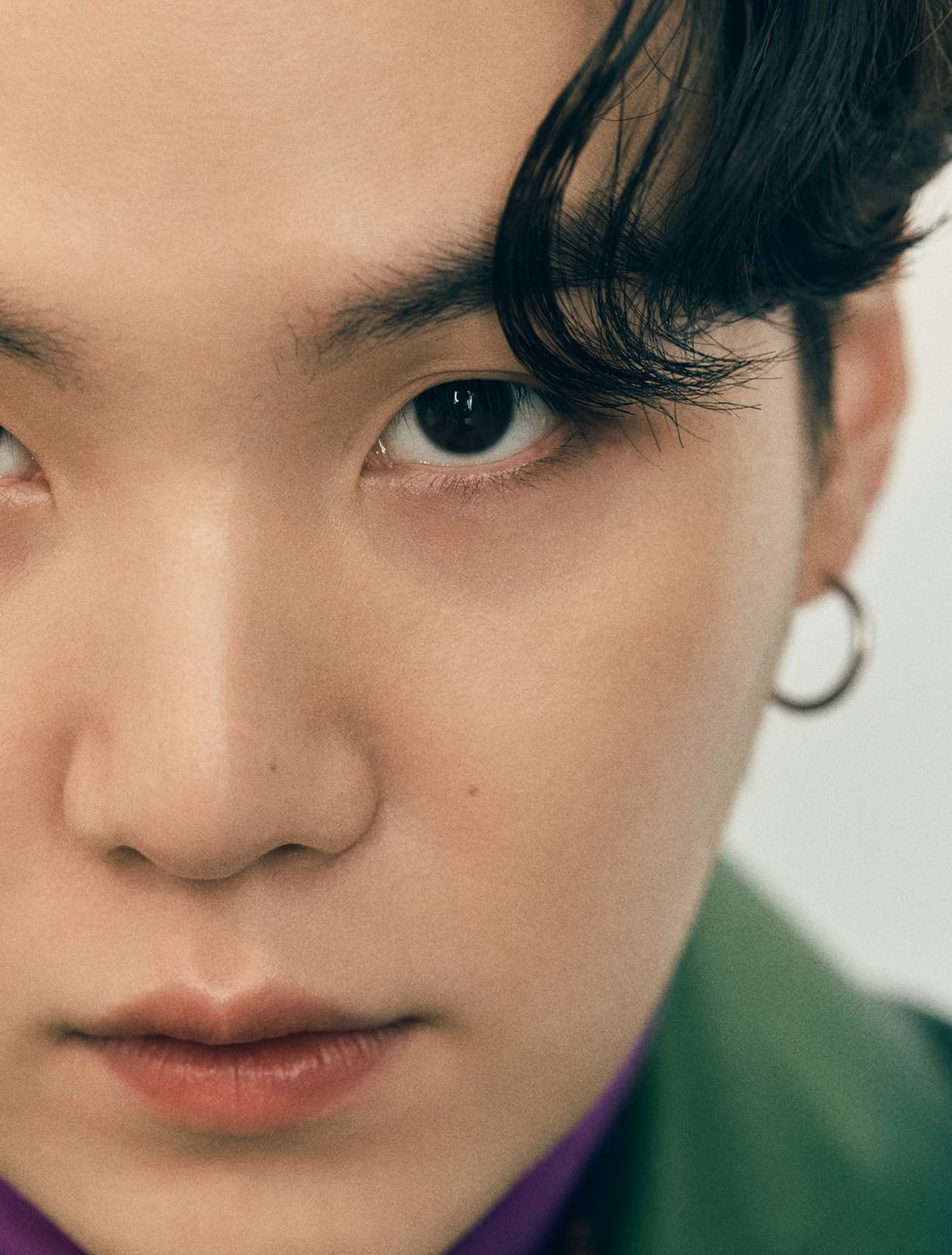
On Suga: Jacket, shirt, turtleneck, and trousers by Berluti.
HONG JANG HYUN
Sometimes there is a whole universe alongside your own, bursting with color you’re too stubborn to see, bouncing with joy you think is for someone else, with a beat you thought you were finished dancing to. BTS are the biggest thing on the planet right now, yet the job of introducing them to someone new, particularly in America, seems like it’s never done. Maybe it’s because they are adored by screaming teenagers and we live in a society patriarchal enough to forget that screaming teenagers are nearly always right. Maybe it’s the cultural divide, in a moment when our country is unashamed enough of its own xenophobia to get openly bent out of shape when it has to press 1 for English. Maybe it’s the language barrier, as though we understood a single word Michael Stipe sang before 1989.
Whatever the reason, the result is that you might be missing out on a paradigm shift and a historic moment of pop greatness.
IF BTS SEEM A BIT CAUTIOUS WITH THEIR WORDS PUBLICLY, IT’S because—perhaps more than any other massive pop act in history—they have to be. Shortly after our second meeting, BTS were given the General James A. Van Fleet Award by the U. S.–based Korea Society for their outstanding contributions to advancing relations between the United States and Korea. In his acceptance speech, RM said, “We will always remember the history of pain that our two nations shared together, and the sacrifices of countless men and women,” as seemingly diplomatic and innocuous a statement as he could have made. But because he didn’t mention the Chinese soldiers who died in the Korean War, it didn’t go over well. The Samsung BTS smartphone disappeared from Chinese e-commerce platforms, Fila and Hyundai pulled ads in China that featured the group, the nationalistic newspaper Global Times accused them of hurting Chinese citizens’ feelings and negating history, and the hashtags “BTS humiliated China” and “there are no idols that come before my country” began trending on the social-media site Weibo. The pressure is not small.
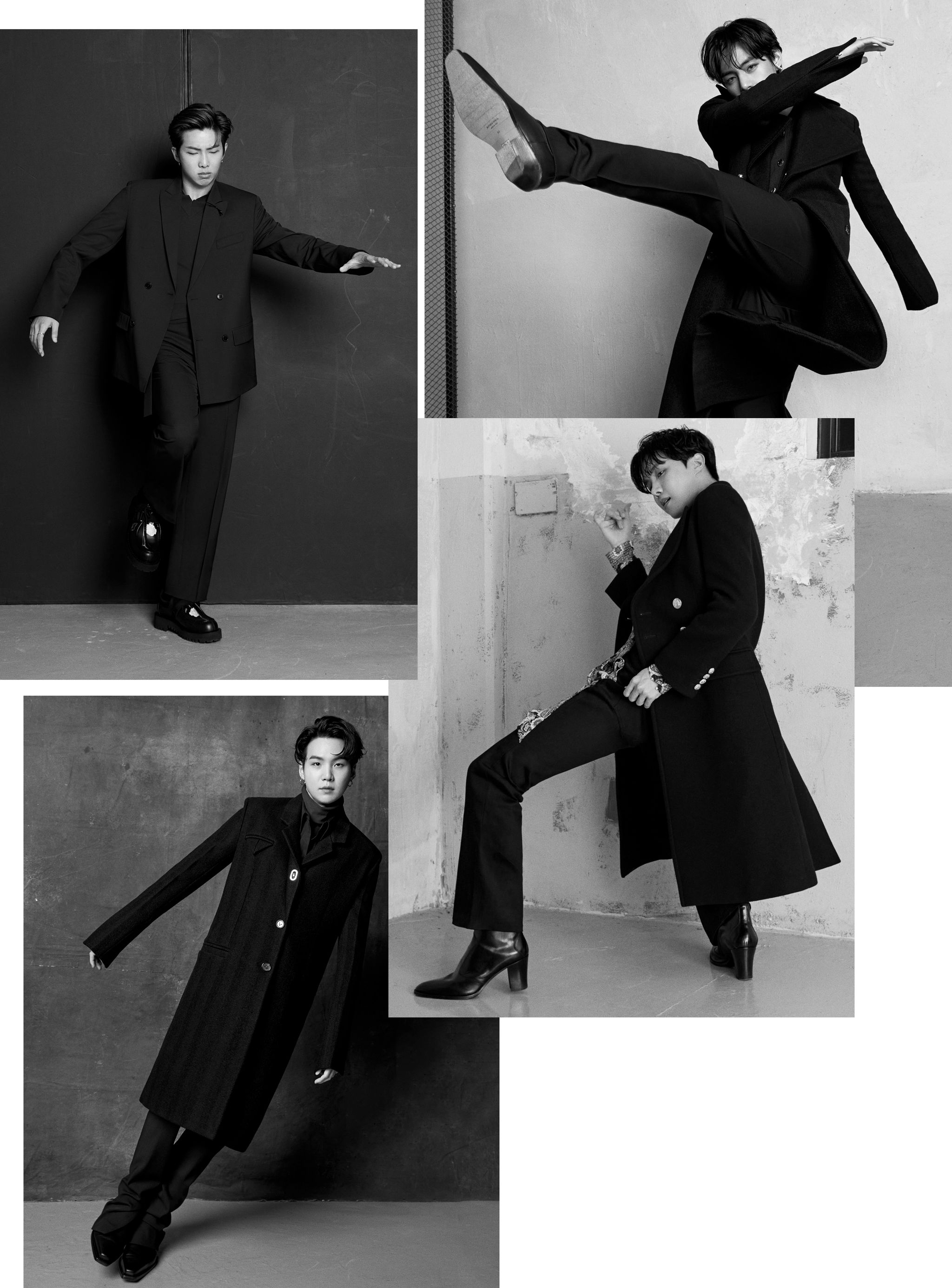
“We have our fans, and we have our music. So we have a lot of things that we have to be responsible for, to safeguard.” RM, says, and then considers it for a moment. “I think that’s what an adult is.”
HONG JANG HYUN
Even as the number-one pop group in the world, even with their hard work day in and day out, even with tens of millions of adoring fans redefining the concept of “adoring fans” by literally healing the planet in their name, these guys still suffer from impostor syndrome. RM explains, “I’ve heard that there’s this mask complex. Seventy percent of so-called successful people have this, mentally. It’s basically this: There’s this mask on my face. And these people are afraid that someone is going to take off this mask. We have those fears as well. But I said 70 percent, so I think it’s very natural. Sometimes it’s a condition to be successful. Humans are imperfect, and we have these flaws and defects. And one way to deal with all this pressure and weight is to admit the shadows.”
This article appears in the Winter 2020/21 issue of Esquire.
subscribe
The music helps. “When we write the songs and lyrics, we study these emotions, we are aware of that situation, and we relate to that emotionally,” J-Hope says. “And that’s why when the song is released, we listen to it and get consolation from those songs as well. I think our fans also feel those emotions, maybe even more than us. And I think we are a positive influence on each other.”
If there’s one thing they’re sacrificing, besides free time and the ability to speak freely without the Chinese foreign ministry releasing an official statement, it’s a love life. I ask about dating, broad questions like “Are you?” and “Is there time?” and “Can you?” and the answer to all of them is pretty clear: “No.” “The most important thing for us now is to sleep,” Jung Kook insists. Suga follows right up with “Can you see my dark circles?” I cannot, because there are none, because flawless skin translates even over Zoom when there’s an ocean between us.
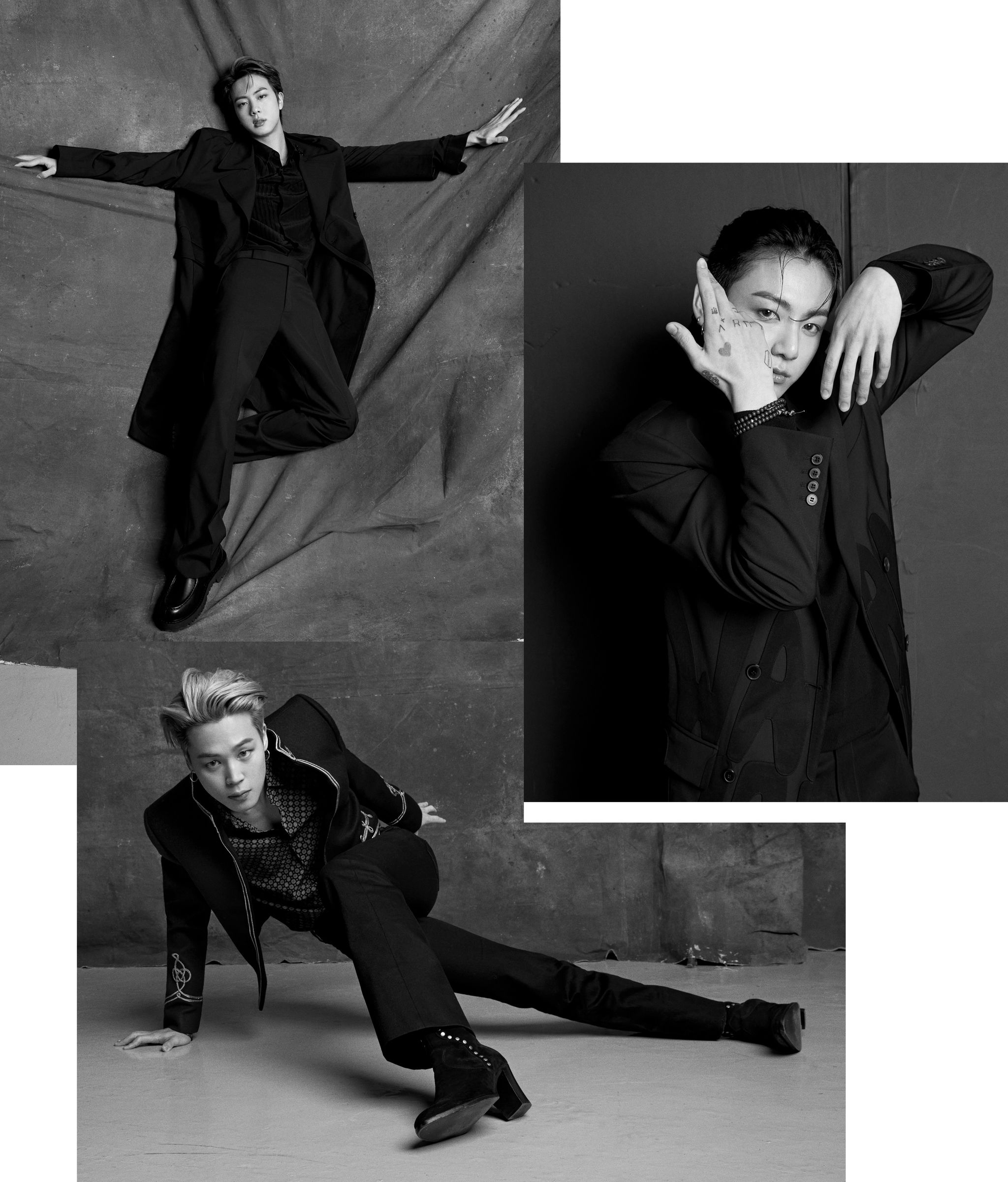
“Jimin has a particular passion for the stage and really thinks about performance, and in that sense, there are many things to learn from him,” j-hope says.
HONG JANG HYUN
So they’re not, at least publicly, having romantic relationships with anyone. If there is a strong relationship that’s guided their journey into adulthood, it’s with Big Hit. “Our company started with twenty to thirty people, but now we have a company with so many employees,” RM says. “We have our fans, and we have our music. So we have a lot of things that we have to be responsible for, to safeguard.” He considers it for a moment. “I think that’s what an adult is.”
“Our love life—twenty-four hours, seven days a week—is with all the ARMYs all over the world,” RM adds.
In a world that is determined to sand down anything that isn’t immediately recognizable to the average pop-music fan, when it comes to acquainting you with Korean culture, BTS very much do not wanna hold your hand. While the first song on night one of their Tonight Show week was a joyous but expected take on “Dynamite” with Fallon and the Roots, they took some chances during their second performance.
As a friend of mine, a thirty-three-year-old BTS fan in Los Angeles, told me, “The second song they performed was ‘IDOL,’ ” from 2018’s Love Yourself: Answer, “and it celebrated their Korean identity. They performed it in Gyeongbokgung Palace in Seoul. They wore clothes inspired by traditional dresses called hanboks;it was almost entirely in Korean, so it felt super subversive. As a fan, I read it as: ‘Dynamite’ was an invitation, and this is who we are and this is our home.”
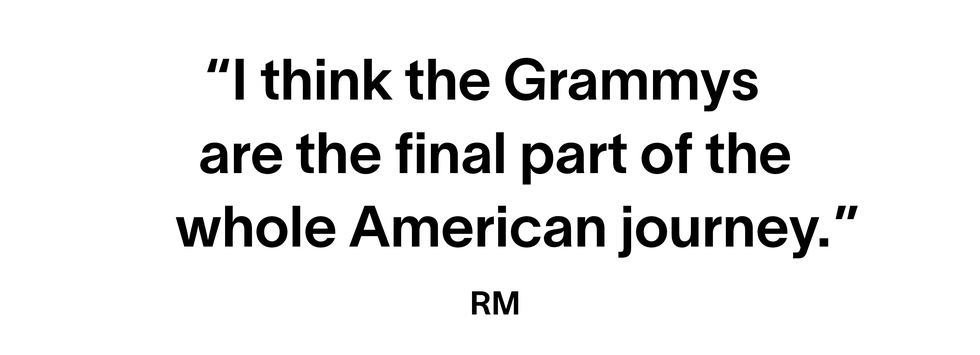
“I was a little concerned that people might not understand,” Fallon says. “I was like, ‘There’s nothing in English here.’ But what you see is just pure star power. Pure talent. Immediately, I thought, Oh, this is everything. If you’re that powerful, it transcends language.”
American popular music in the twenty-first century is more fragmented than it has been since . . . well, since Allan Sherman, Leonard Bernstein and Stephen Sondheim, and the Singing Nun battled for that number-one spot. The monoculture that the Beatles helped bring on has breathed its last breath. Each of us is the program director for our own private radio station,
letting our own past habits and streaming-service algorithms serve up something close to what we want. Which is great, except that huge moments can whiz right past our ears. Each of us, even if we’re more clued in than our parents were when they were our age, can miss some era-defining, excellent shit. Particularly if the radio is our Spotify Discover Weekly, or the Pandora channel based on the band whose T-shirts we wore in college. We can let a moment pass us by if prime time is a Netflix binge, and the Tonight Show hour is spent on one more episode before bed. But we shouldn’t. “Honestly, I think it’s history that we’re living through with BTS,” Fallon says. “It’s the biggest band I’ve seen since I’ve started late night, definitely.”
THERE IS ALSO THE SMALL DETAIL THAT, UNLIKE THE BEATLES AND literally every other worldwide sensation to break in America, BTS don’t particularly need to go to the trouble. They are massive all over the world. Thanks to the recent IPO of Big Hit Entertainment, of which each member is a partner, they are all now incredibly wealthy. (Hitman Bang is the first South Korean entertainment mogul to become a billionaire.) What good is a culture in decline to a pop act this much on the ascent? “When I dreamed of becoming an artist, I listened to pop and watched all the awards shows in the United States. Being successful and being a hit in the U. S. is, of course, such an honor as an artist,” says Suga. “I feel very proud of that.”
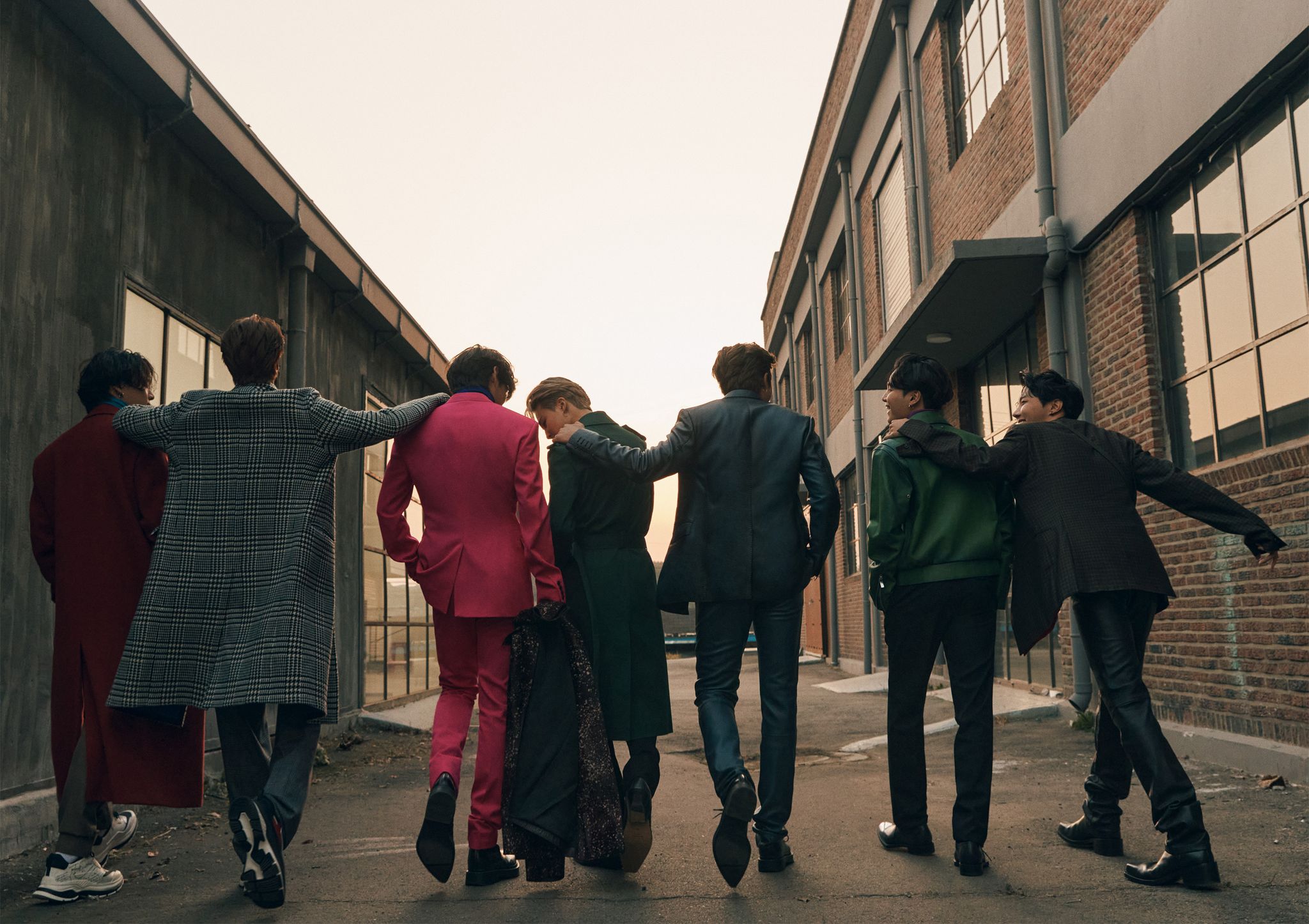
From left: On Jung Kook: Coat, trousers, and sneakers by Berluti. On Jin: Coat, trousers, and sneakers by Berluti. On V: Coat, jacket, trousers, and shoes by Berluti. On Jimin: Coat, trousers, boots, and earring by Bottega Veneta. On RM: Jacket, trousers, and shoes by Berluti. On Suga: Jacket, trousers, and shoes by Berluti. On J-Hope: Jacket, trousers, and boots by Givenchy.
HONG JANG HYUN
They’re breaking out in a country that either worships them or fails to notice them. So do they feel like they’re getting enough respect in America? “How can we win everyone’s respect?” Jin asks. “I think it’s enough to get respect from people who support us. It’s similar everywhere else in the world. You can’t like everyone, and I think it’s enough to be respected by people who really love you.”
Suga agrees. “You can’t always be comfortable, and I think it’s all part of life. Honestly, we are not used to getting a ton of respect from when we first started out. But I think that gradually changes, whether it be in the States or other parts of the world, as we do more and more.”
There is, without a doubt, one colossal, unmistakable sign of respect for a musician: a Grammy. They’ve been nominated only once, and even then it was for best recording package. But their sights are set on a big one next year. RM puts it out there: “We would like to be nominated and possibly get an award.” Dragging the hoary, backward-looking, and Western-focused Grammys into the gorgeous, global world of the present through sheer force of will, talent, and hard work? Stranger things have happened. “I think the Grammys are the last part, like the final part of the whole American journey,” he says with a smile. “So yeah, we’ll see.”
The Recording Academy’s seal of approval is one thing. But BTS have already conquered the world, clowned tyrants, inspired individual fans to perform the small and achievable acts of activism that have collectively begun to save the planet, challenged toxic masculinity by leading with vulnerability, and, along the way, become bajillionaires and international idols. Whether the Grammys are paying attention matters about as much as what an Ed Sullivan audience member expected to see that night in 1964. BTS have already won.
Join Esquire Select
-
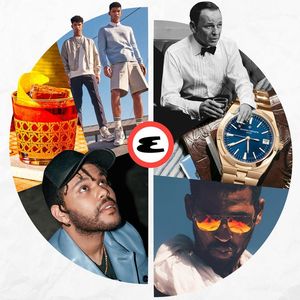
Get Unlimited Access to Esquire + the Magazine

Dave Holmes
Editor-at-Large
Dave Holmes is Esquire’s L.A.-based editor-at-large. His first book, “Party of One,” is out now.






